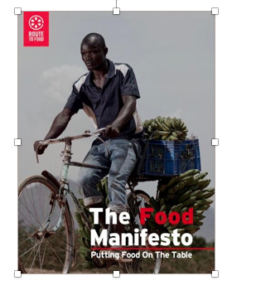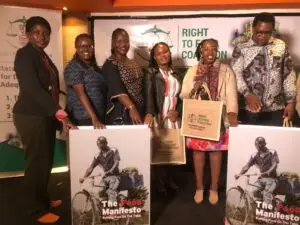According to Oxfam, over a quarter of a billion more people could crash into extreme levels of poverty in 2022 because of COVID-19, rising global inequality and the shock of food price rises supercharged by the war in Ukraine.1According to the Kenya Food Security Steering Group(KFSSG’s) Annual Short Rains Assessment, there are 3.1 food- insecure people in pastoral and marginal lands, this accounts for 48 percent increase since 2021.
The effects of a third consecutive below-average rainy season are resulting in deteriorating food security outcomes driven by the impacts of poor crop and livestock production, resource-based conflict, livestock disease and mortality, and the COVID-19 pandemic. In February 2022, the KFSSG’s annual Short Rains Assessment reported that there are around 3.1 million food-insecure people in pastoral and marginal agricultural areas, a 48 percent increase since August 20212.Due to the prolonged drought, the Ministry of Agriculture in Kenya reports that a total of 1.5 million livestock died in three months to march, this putting the lives of pastoralists who rely on animals at stake. Of these 253,000 were cattle, 1.21 million sheep/goats and 43 were camels.3The most affected regions of the country are arid and Semi-Arid(ASAL) areas. According to the Kenya National Bureau of Statistic (KNBS), the overall inflation rate as measured by Consumer Price index(CPI) or the cost of living index, rose mainly due to an increase in food prices and those of non-alcoholic beverages.4
Prices of basic commodities have risen in the country for example a 2kg of maize costs between Kshs 200 to 215 , this has since then reduced to Kshs 150 , with a subsidised one going for Kshs 100 but is not available.The price of cooking oil has also skyrocketed. This is coming in the wake of the negative economic impacts of COVID-19 including job losses and closure of business.
The Food Manifesto assesses the current food security issues, demystifies some of the common myths and misconceptions about food and provides proposed interventions to address the current food security issues in Kenya as well as bold a foundation for a sustainable, equitable food system for Kenya.
The Route to Food Coalition, co-organised the Launch of Food Manifesto at Villa Rosa, in Nairobi. The meeting had over 100 participants who included government officials, Civil Society Organisation(CSOs), media, current and aspiring politicians and the media.Haki Nawiri Afrika was one of the represented CSOs.
The Food Manifesto looks at the current food security issues, demystifies some of the common myths and misconceptions about food and provides nine (9) proposed interventions to address the current food security issues in the country as well as build a foundation for a sustainable, equitable food system for Kenya. As a coalition of organizations that champions the Right to adequate food for all Kenyans as espoused in the Kenyan Constitution, article 43 (1) (c).
Why a Food Manifesto
- The belief that it is important for political leaders to include food agenda in their political manifestos at a time when the country is gearing up to have a change of guard at all levels of leadership
- To have all stakeholders think have all the relevant stakeholders think critically about the political economy of
- Witnessing the devastating effects of hunger on citizenry including food unavailability inaccessibility, rising cost of food
- More than 5 million Kenyans suffer from chronic food insecurity while a further
1.5 million people are constantly exposed to severe food insecurity and the risk of starvation.
- The fact that the political will and commitment is the missing ingredient in addressing Kenya’s perennial food problems
- Agricultural sector employs 40 percent of the Kenyan population and 70% of Kenya’s
rural population according to FAO.
The launch involved speeches by sitting and aspiring politicians, government officials (Ministry of Agriculture and Nairobi City County CSOs) and Kenyan citizens on their take on agriculture in the county.
The Food Manifesto
There is a link between food and national security.In Kenya, food is not being accorded the importance is deserves. An example was given of demonstrations done by Njaa(hunger) Revolution activists in the Central Business District where Kenyans who are also affected by the rising cost of food instead of joining the protests over food, peep at protestors through windows wa emphasised that there is need to spend more on budgetary allocation for food because food has the potential of causing insecurity.
The lack of agricultural extension services in Kenya directly affects food production. Annually there are adverts for police officers and army however agriculture which is the backbone of the country hardly ever gets to have extension service officers advertised.This has resulted into the abandonment of agriculture and farmers , particularly smallholder farmers are left at the mercy of multinational corporations in the agro-chemical and seed industry who sell seeds and agrochemicals that end up affecting the soil and yields.
Since the Maputo Declaration, there has never been adequate allocation of resources to agriculture and that despite its impotence, agriculture is not given enough attention and enough budget allocated to the sector.It is a high time Kenyans participate more meaningfully in the budgetary processes at county levels and and demand more money to be allocated to agriculture. It is very disorienting to quote very many statistics on agriculture being the backbone of the country while citizens continue to go hungry.
Youth will not be attracted to agriculture if the problem of the past has not been resolved. It was discussed that agriculture can be made to be more attractive to the youth who can engage in various levels of the value chain. When agriculture is fully funded by the state and there is available infrastructure to support farming, Kenyan youth will not be complaining of lack of jobs because there is a lot of potential in agriculture, this, it was said is because food is something consumed every day and there is always a ready market.
With regards to agriculture and food production, Kenya’s envisioned future is one where resources are adequately available for agriculture and images of farmers tattered clothes and sweating in the sun to be a thing of the past. Farmers , especially smallholder farmers should be supported because they produce the bulk of the food consumed in Kenya.The most important thing that the Kenyan government ought to do is to provide the requisite budgetary allocation to agriculture that ensures farmers can produce , invest in research that benefits smallholder farmers and learn from farmers and not impose ideas on farmers.In Kenya , there is more emphasis and support to commercial farmers than to smallholder farmers, yet these form the bulk of food producers in the country.
Kenya is gearing up for general elections , with just a few days to go.Food is political and politicians are not the only stakeholders when it comes to matters food.At the moment , Kenya is in an electioneering mood , but very few people are discussing food during campaigns .There is need to the electorate to demand realisation of the right to food.It is quite rhetoric that campaigns have been going on for elections yet people are dying of hunger and being ravaged by the negative impacts of climate change.It is also important to interrogate political manifestos and what they are saying about right to food.
Industrial agriculture is one of the reasons why the world is in a mess today because of climate change .It is about time countries, Kenya included adopted agroecology .Scientists go to labs , develop materials and then come to demonise what farmers grow , labelling them as ” unproductive” .However, the best form of food production is where there is co-creation of knowledge.It is a high time , scientists came to down to the farmers and learnt from them.
In the wake of climate crisis and food insecurity coupled with the rising global food prices , what Kenyans need is a responsive state that ensures the right to food is promoted and protected, that farmers are supported to produce food in dignity, that citizens are able to feed themselves in dignity and where vulnerable people are enabled to access food through social protection.
Launch of the Food Manifesto

References
- https://oxfam.org/en/press-releases/terrifying-prospect-over-quarter-billion-more-people-crashing- extreme-levels-poverty
- https://reliefweb.int/report/kenya/kenya-food-security-outlook-update-february-september-
2022#:~:text=In%20February%202022%2C%20the%20KFSSG’s,percent%20increase%20since%20August%2020 21.
- https://www.businessdailyafrica.com/bd/economy/1-5m-livestock-die-on-biting-drought-3781484
- https://www.standardmedia.co.ke/business/business/article/2001443132/kenya-tops-countries- with-high-food-prices-in-latest-ranking

